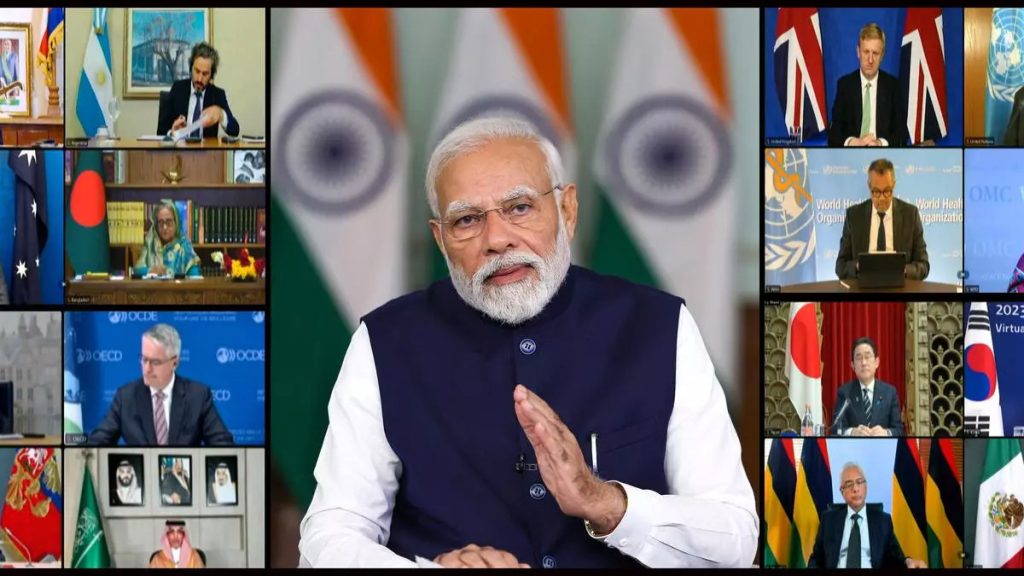 The first-ever virtual G20 summit hosted by India ended with India unveiling a slew of proposals for welfare of the Global South and expressing concerns about a potential escalation of the Israel-Hamas war.
The first-ever virtual G20 summit hosted by India ended with India unveiling a slew of proposals for welfare of the Global South and expressing concerns about a potential escalation of the Israel-Hamas war.
In his remarks, Prime Minister Narendra Modi, who hosted the virtual summit, highlighted India’s pro-South initiatives and proposed the creation of a Social Impact Fund to help implement Digital Public Infrastructure (DPI) in Global South countries.
PM Modi announced that India will contribute initial capital of $25 million to the Social Impact Fund and expressed hope that the others in the grouping would join this initiative.
Mr Modi added that the DPI repository, a key decision of Delhi G20 Leaders Summit, is now ready and 16 countries with over 50 DPIs are now on board this initiative.
Gaza Concerns
Voicing serious concern about the ongoing Israel-Hamas conflict, Prime Minister Narendra Modi told the leaders of G20 countries virtually that it was important to ensure that the war doesn’t escalate into a regional conflict. Mr Modi underlined that new challenges have arisen in the last months and the “situation of insecurity and instability in the West Asia region was a matter of concern”. It was also the first gathering of global leaders after the outbreak of the Israel-Palestine conflict in West Asia.
PM Modi’s remarks came amid the truce deal between Israel and the Palestinian terrorist group Hamas. However, the death toll in the Gaza and surrounding enclave has since risen past 14,100 — including more than 5,800 children and 3,900 women. According to the independent Euro-Mediterranean Human Rights Monitor, nearly 34,000 were injured and The Israeli death toll as estimated is around 1,200.
Prime Minister Modi also emphasized the need for continuous flow of humanitarian aid in the conflict zone. “It is necessary to ensure timely and continuous delivery of humanitarian aid. It is also necessary to ensure that the war between Israel and Hamas does not escalate into a regional conflict.”
While the virtual summit focused on inclusive development of the Global South and global economic and governance structures, the G20 leaders expressed concerns over the escalating conflict in West Asia.
Regulating AI
India also called for global regulations for artificial intelligence during the summit. Amid the rising threat and misinformation leading to the emergence of deepfakes and such alarming situations worldwide, PM Modi also spoke about the emergence of deepfake videos on social media. He called for global regulations for Artificial Intelligence (AI).
“The world is worried about the negative effects of AI. India thinks that we have to work together on the global regulations for AI. Understanding how dangerous deepfakes are for society and individuals, we need to work forward. We want AI to reach the people, it must be safe for society,” he said.
Earlier, India had raised concern over the rising cyber security threat and the need to generate advanced tools that can be deployed cheaply and at a formidable scale to counter new risks (like fake news), fresh forms of discrimination and bias, and threats to data protection.
“In Delhi Declaration, we expressed commitments in various sectors, today we have again resolved to take forward those… after listening to your points on the situation in West, I can say that there are agreements on several issues in G20 -Zero Tolerance to terrorism, killing of civilians unacceptable, humanitarian aid should reach soon, humanitarian pause, hostage release announcement welcomed, 2 state solution, need regional stability, dialogue & diplomacy.”
The virtual summit marked the end of India’s G20 presidency as Brazil will take over the role. The summit witnessed the participation of leaders from all G20 member countries, the Chair of the African Union, and representatives from nine guest countries, along with the heads of 11 international organizations.
The virtual summit was attended by Brazilian President Luiz Inacio Lula da Silva, UAE President Mohammad bin Zayed Al Nahyan, Russian President Vladimir Putin, Bangladeshi Prime Minister, European Commission President Ursula von der Leyen, IMF Managing Director Kristalina Georgieva, Canadian Prime Minister Justin Trudeau, among others.
However, the absence of Chinese President Xi Jinping at the G20 virtual Summit was conspicuous. External Affairs Minister S. Jaishankar downplayed the absence of Xi ar the virtual summit. “It’s for a country to decide who represents them, and Prime Minister Li Qiang had represented them at the G 20 New Delhi summit as well, so they chose to continue with that.
(Manish Jha contributed inputs for this article)
Author Profile
- India Writes Network (www.indiawrites.org) is an emerging think tank and a media-publishing company focused on international affairs & the India Story. Centre for Global India Insights is the research arm of India Writes Network. To subscribe to India and the World, write to editor@indiawrites.org. A venture of TGII Media Private Limited, a leading media, publishing and consultancy company, IWN has carved a niche for balanced and exhaustive reporting and analysis of international affairs. Eminent personalities, politicians, diplomats, authors, strategy gurus and news-makers have contributed to India Writes Network, as also “India and the World,” a magazine focused on global affairs.
Latest entries
 DiplomacyJanuary 5, 2026India walks diplomatic tightrope over US operation in Venezuela
DiplomacyJanuary 5, 2026India walks diplomatic tightrope over US operation in Venezuela India and the WorldNovember 26, 2025G20@20: Africa’s Moment – The Once and Future World Order
India and the WorldNovember 26, 2025G20@20: Africa’s Moment – The Once and Future World Order DiplomacyOctober 4, 2025UNGA Resolution 2758 Must Not Be Distorted, One-China Principle Brooks No Challenge
DiplomacyOctober 4, 2025UNGA Resolution 2758 Must Not Be Distorted, One-China Principle Brooks No Challenge India and the WorldJuly 26, 2025MPs, diplomats laud Operation Sindoor, call for national unity to combat Pakistan-sponsored terror
India and the WorldJuly 26, 2025MPs, diplomats laud Operation Sindoor, call for national unity to combat Pakistan-sponsored terror







